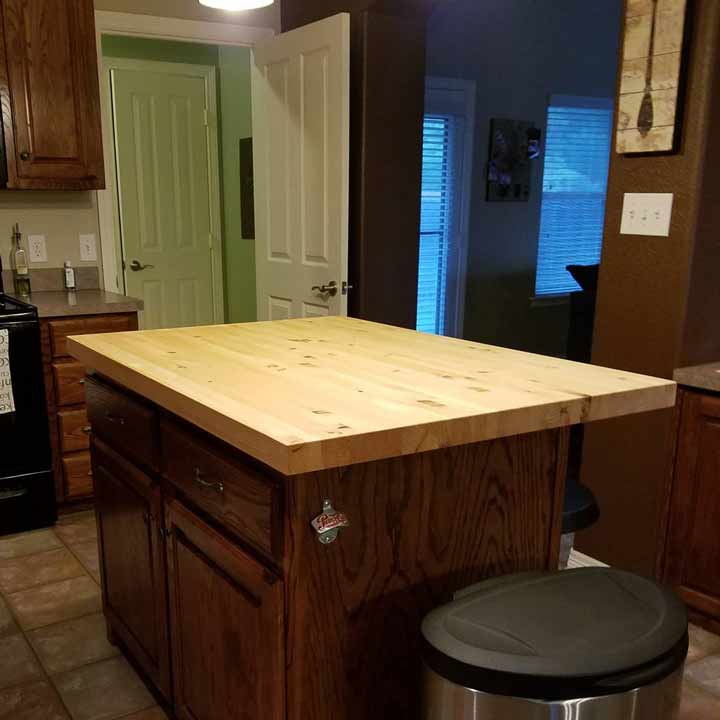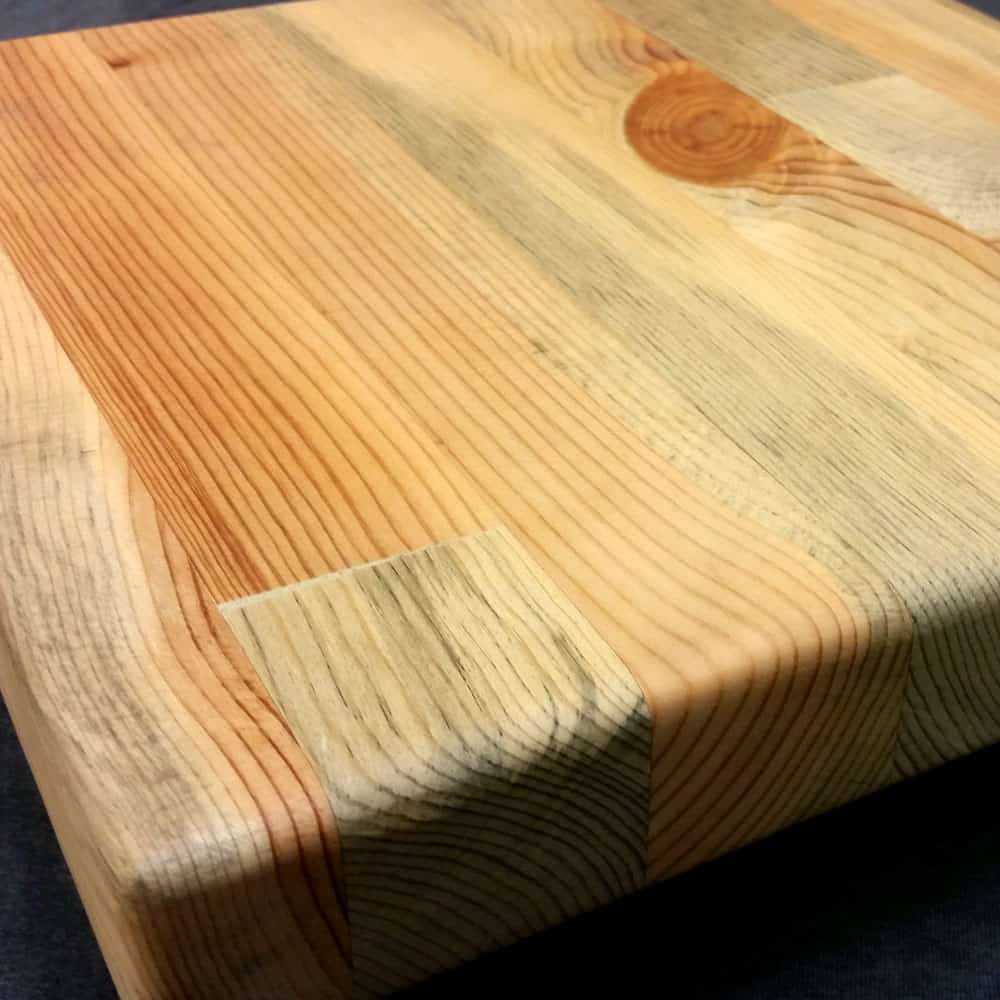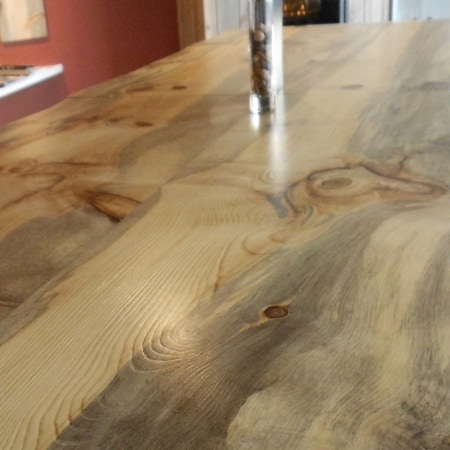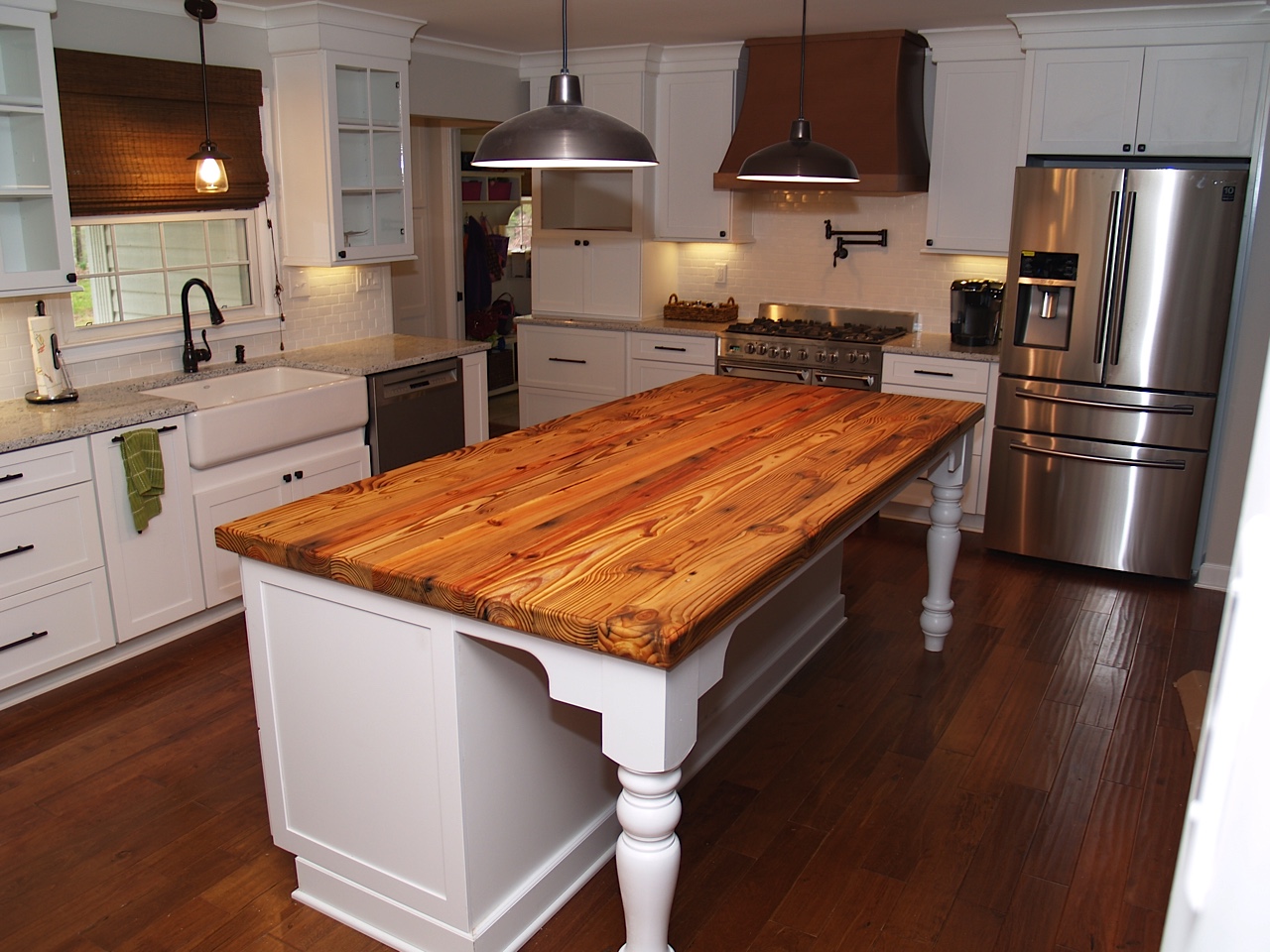Pine butcher block countertops have gained popularity as a stylish yet functional choice for kitchens and other workspaces. These countertops bring warmth and a rustic charm to interiors, providing a natural look that blends well with both modern and traditional designs. Unlike stone or laminate options, butcher block countertops are made from thick, solid wood boards that are glued together to create a sturdy, smooth surface. Pine, being a softwood, is one of the more affordable options in the butcher block category. Though slightly softer than hardwoods like maple or oak, pine offers unique aesthetic qualities, making it a preferred choice for homeowners seeking a natural, earthy feel in their kitchen design. Understanding the characteristics, maintenance requirements, and limitations of pine butcher block countertops is essential for making an informed decision about this material.
One of the primary reasons people choose pine butcher block countertops is their affordability. Pine is generally less expensive than hardwoods, making it an attractive option for those on a budget who still want the natural appeal of wood countertops. The light color of pine can brighten up kitchen space and give a clean, inviting appearance that suits a variety of styles. It also takes stains and finishes well, allowing homeowners to customize the look of their countertops to match the overall design scheme of their home.
While pine is a softer wood, it does have the advantage of being more lightweight than denser hardwoods like maple or walnut. This makes pine easier to install and handle during the construction process. However, the softness of pine can also be a drawback, as it is more prone to dents, scratches, and wear over time. For homeowners who prefer a more lived-in, rustic look, the natural aging of the pine wood can add to its character. However, for those who want a sleek, pristine appearance, extra care and regular maintenance may be required to keep the surface in top condition.
Pine butcher block countertops are versatile in their design options. The wood can be left unfinished for a raw, natural look or treated with various stains and finishes to enhance its durability and appearance. Unfinished pine countertops are more susceptible to moisture damage, so applying a protective finish, such as mineral oil or polyurethane, is highly recommended. Mineral oil provides a natural, food-safe finish that needs to be reapplied regularly, while polyurethane offers a more durable, water-resistant surface that requires less maintenance.

The grain pattern in pine adds to its appeal as a countertop material. Pine has a straight, sometimes wavy grain, which contributes to the unique visual texture of the wood. Over time, as the wood ages and develops a natural patina, these grain patterns become more pronounced, adding depth and warmth to the surface. Some homeowners appreciate the knots and imperfections that come with pine, as these features contribute to its rustic, organic aesthetic. Others may prefer clearer, more uniform wood grains, in which case a different species of wood may be more suitable.
Another benefit of pine butcher block countertops is that they can be sanded down and refinished when needed. If the surface becomes scratched or worn, a light sanding can remove the imperfections, followed by the application of a fresh coat of oil or finish to restore the wood’s appearance. This ability to refinish the surface gives butcher block countertops a longer lifespan compared to materials like laminate, which cannot be easily repaired once damaged.
Despite the advantages, pine butcher block countertops do require more upkeep than harder, more durable countertop materials. Regular oiling is necessary to keep the wood hydrated and to prevent it from drying out, cracking, or absorbing moisture. Additionally, since pine is a softer wood, it can be easily dented or scratched by sharp objects, so cutting boards should always be used to protect the surface. Homeowners should also be cautious of placing hot pots or pans directly on the wood, as heat can cause discoloration or warping over time.

One common concern with wood countertops, including pine, is the potential for moisture damage. Because wood is porous, it can absorb water if not properly sealed, leading to warping, swelling, or mold growth. To prevent this, it’s essential to regularly seal the countertop and promptly wipe up any spills. Installing pine butcher block countertops in areas with high humidity, such as near sinks or dishwashers, may require extra attention to sealing and maintenance to ensure the longevity of the wood.
Pine butcher block countertops also bring a level of warmth and comfort to the kitchen environment that is unmatched by harder, colder materials like granite or quartz. The natural wood surface is softer underfoot, making it more comfortable for those who spend long hours cooking or working in the kitchen. Additionally, wood has a natural insulating quality, which can help keep the kitchen warmer, particularly in colder climates.
For those concerned about sustainability, pine is a relatively eco-friendly option. Pine trees grow faster than many hardwood species, making them a renewable resource. Many pine butcher block countertops are made from sustainably harvested wood, further reducing the environmental impact. Additionally, the long lifespan of wood countertops means they won’t need to be replaced as often as other materials, contributing to reduced waste in the long run.
Pine butcher block countertops can also be paired with a variety of kitchen styles. They work well in farmhouse, rustic, and cottage-style kitchens, where the natural wood enhances the cozy, lived-in feel. However, pine countertops can also be incorporated into more modern or minimalist designs, particularly when combined with sleek cabinetry and fixtures. The ability to stain or finish pine in different tones allows for customization, making it a versatile choice for various interior design themes.

Another factor to consider with pine butcher block countertops is how they age over time. While some homeowners appreciate the way pine darkens and develops a patina as it ages, others may prefer to keep the wood looking fresh and new. Regular sanding and finishing can help preserve the original appearance of the wood, but it’s important to remember that pine will naturally change color over time due to exposure to light, air, and use.
When it comes to installation, pine butcher block countertops are generally more DIY-friendly than stone surfaces like granite or quartz, which require professional handling. However, proper installation is crucial to ensure the wood is level, secure, and properly sealed to protect against moisture. Homeowners who are comfortable with woodworking may choose to install their own countertops, while others may prefer to hire a professional to ensure a precise fit and finish.
Pine butcher block countertops also contribute to a healthier indoor environment. Wood has natural antibacterial properties, which can help reduce the presence of harmful bacteria on the surface. Additionally, the lack of chemical treatments and finishes in some butcher block countertops means fewer toxins are released into the air, contributing to better indoor air quality.
While pine butcher block countertops offer a unique aesthetic and practical benefits, they may not be the best choice for every kitchen. Homeowners should consider their cooking habits, lifestyle, and willingness to perform regular maintenance before committing to this material. For those who are willing to invest the time and care needed to maintain a pine butcher block countertop, the result is a warm, inviting kitchen surface that can last for many years.

Common Mistakes to Avoid
One common mistake with pine butcher block countertops is failing to apply a protective finish. Without sealing the wood, it is vulnerable to moisture, staining, and warping. Another mistake is using the countertop as a cutting surface. Pine is a soft wood, and cutting directly on the countertop can leave deep scratches and gouges that are difficult to repair. Additionally, placing hot pots or pans directly on the surface can lead to burn marks or warping, so it’s important to use trivets. Lastly, neglecting regular maintenance, such as oiling the wood, can cause the countertop to dry out, making it more susceptible to cracking and other damage.

How often should I oil my pine butcher block countertop?
Pine butcher block countertops should be oiled regularly to keep the wood hydrated and protected from moisture. For new countertops, it’s recommended to oil them once a week for the first month and then once a month thereafter. The frequency of oiling can vary depending on the amount of use the countertop sees, but regular oiling will prevent the wood from drying out and cracking.
Can pine butcher block countertops be used near a sink?
Yes, pine butcher block countertops can be used near sinks, but they require proper sealing and maintenance to protect against moisture damage. Since wood is porous, it can absorb water, leading to warping or mold if not properly sealed. Applying a water-resistant finish and promptly wiping up spills will help extend the life of the countertop in moisture-prone areas.
How do I remove scratches from my pine butcher block countertop?
Minor scratches can often be sanded out using fine-grit sandpaper. After sanding, the area should be wiped clean and re-oiled to restore the finish. For deeper scratches or gouges, you may need to sand the entire surface and refinish it to achieve an even appearance. Regularly oiling the countertop can also help reduce the appearance of scratches over time.

Can I stain my pine butcher block countertop?
Yes, pine butcher block countertops can be stained to achieve a darker or more customized color. Pine takes stain well, but it’s important to sand the surface evenly before applying the stain to ensure a consistent finish. After staining, a protective sealant should be applied to safeguard the wood from moisture and wear.
Are pine butcher block countertops durable enough for daily use?
While pine is a softer wood compared to hardwoods like oak or maple, it is still durable enough for daily use when properly maintained. The surface may develop dents or scratches over time, but many homeowners appreciate the natural, worn-in look that comes with use. With regular maintenance, such as oiling and avoiding direct cutting on the surface, pine countertops can last for many years.
Can I install pine butcher block countertops myself?
Pine butcher block countertops are generally more DIY-friendly than materials like granite or quartz, making them a popular choice for homeowners who want to tackle their kitchen renovation. However, proper installation is key to ensuring a long-lasting countertop. If you’re comfortable with woodworking tools and techniques, you may be able to install the countertops yourself, but hiring a professional can ensure a precise fit and finish.

My Take on Butcher Block Countertops”Woodnu0027t” You Like to Know

Countertops – Brun Millworks

Related articles:
- Butcher Block Countertop For Kitchen Island
- Can You Paint Butcher Block Countertops
- Butcher Block Countertops With White Cabinets
- Pine Butcher Block Countertops
- Butcher Block Countertops Walnut
- Maple Butcher Block Countertops
- Care Of Butcher Block Countertop
- Butcher Block Countertops Maintenance
- Antique Butcher Block Countertops
- Butcher Block Countertop Sealing